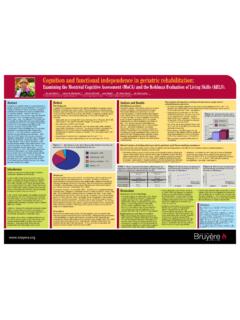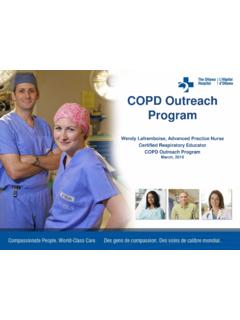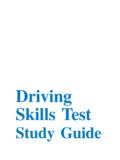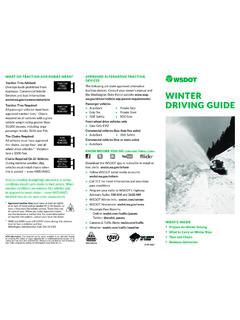Transcription of THE DRIVING DEMENTIA - RGPEO
1 THE DRIVING AND. DEMENTIA . TOOLKIT. (3RD EDITION). (FOR HEALTH PROFESSIONALS). The The Champlain DEMENTIA Network Regional Geriatric Program of Ottawa-Carleton of Eastern Ontario R seau de la d mence Programme g riatrique r gional de d'Olat region t a w a - Champlain Carleton de l'Est de l'Ontario Dear Colleagues: This is the third updated edition of the DRIVING and DEMENTIA Toolkit for Health Professionals. The Toolkit was originally developed in 1997 by the DEMENTIA Network of Ottawa (now renamed the Champlain DEMENTIA Network) and by the Regional Geriatric Assessment Program of Ottawa (now renamed the Regional Geriatric Program of Eastern Ontario). The diagnosis of DEMENTIA does not imply an automatic license suspension as some people with very mild DEMENTIA can continue to drive for a limited period of time.
2 However, you must ask if your patient with DEMENTIA drives, and if he/she drives, you must evaluate their safety to continue to do so. This is a challenging area of DEMENTIA care with limited research. The toolkit is meant to bridge the gap by providing background information on DRIVING and DEMENTIA , an algorithm on how to navigate the process of assessment of fitness-to-drive, and resources which can be adapted as required to your local needs. The new edition updates and expands upon the earlier versions of the toolkit in that we are offering additional information related to the assessment of one's DRIVING ability as well as how to effectively communicate verbally (and in writing) the findings to the patient, the caregivers and to the legal authorities. A separate DRIVING and DEMENTIA Patient/Caregiver Toolkit will be available as well, specifically designed for those who must face this issue.
3 This toolkit has been developed by an interdisciplinary team of health professionals from geriatric medicine, physiatry, family medicine, occupational therapy, social work, nursing and the Alzheimer Society. The material is Copyrighted by the Copyright Act of Canada. This means you are welcome to reprint or photocopy (for individual use but not for commercial purposes) any of the materials as required, whenever you come across a patient whose cognitive changes may affect their ability to drive. Please acknowledge the source, if you use this material in presentations or publications. We hope you will find the materials of benefit. This toolkit is also available in French and it can be accessed as well on the Regional Geriatric Program of Eastern Ontario website at www. We welcome your feedback to improve future editions (please use the feedback form located in the back pocket of the toolkit, or Thank you, Anna Byszewski MD MEd FRCP (C).)
4 Members of the Ottawa DRIVING Toolkit working group: Fara Aminzadeh RN, MScN GNC , Advance Practice Nurse (Community Research), Regional Geriatric Program of Eastern Ontario Leslie-Ann Baillou CCFP, Care of the Elderly Program, Bruyere Continuing Care, Anna Byszewski MD MEd FRCP(C) Regional Geriatric Program of Eastern Ontario William Dalziel MD FRCP(C) Regional Geriatric Program of Eastern Ontario Malcolm Hing MD FRCP(C) Regional Geriatric Program of Eastern Ontario Lynn Hunt OT, OT Reg (Ont) The Ottawa Hospital Rehabilitation Centre Shawn Marshall MD FRCP(C) The Ottawa Hospital Rehabilitation Centre Frank Molnar MDCM MSC FRCP(C) Regional Geriatric Program of Eastern Ontario Kelly Robinson RSW The Alzheimer Society of Ottawa and Renfrew County TABLE OF CONTENTS. Page 1. GENERAL STRATEGIES 3.
5 INTRODUCTION 4. ASSESSMENT ALGORITHM / ROAD MAP 5. FREQUENTLY ASKED QUESTIONS FOR HEALTH PROFESSIONALS 6-7. 2. ASSESSMENT 9. PHYSICIAN / HEALTH PROFESSIONAL 10 MINUTE OFFICE BASED 10. DEMENTIA AND DRIVING CHECKLIST. HOW TO EFFECTIVELY FILE THE REPORT TO THE PROVINCIAL 11. REGISTRAR. 3. AFTER THE ASSESSMENT NEXT STEPS 13. A. GENERAL PRINCIPLES 14. B. STILL SAFE BUT NEEDS FOLLOWUP 15. i. PREPARATION FOR DRIVING CESSATION 15. C. UNCERTAIN 16. i. STRATEGIES 16. D. UNSAFE TO DRIVE 17. i. DISCLOSURE MEETING 17. ii. HOW TO EMOTIONALLY SUPPORT THE 18. PATIENT/CAREGIVER. iii. SAMPLE - WRITTEN STATEMENT TO THE PATIENT 19. 4. USEFUL RESOURCES 20. LIST OF RESOURCES 20. INSERTS (BACK POCKET) 21. 1. 2. 1. GENERAL STRATEGIES. 3. INTRODUCTION. In Canada, because of the wide geographic distribution of our population, DRIVING is very important.
6 In many areas, including rural communities, public transportation alternatives are limited. As our population ages, numerous co-morbidities can contribute to increased risk for the person who drives. We also do not prepare well for the possibility that one day we may need to stop DRIVING , and most people incorrectly assume they will drive for the remainder of their lives. DEMENTIA impacts on DRIVING safety and is increasingly prevalent with age. Although a diagnosis of DEMENTIA does not mean an automatic license suspension in Canada, (as in the state of Oregon and California in the United States), DRIVING fitness must be evaluated in a person with DEMENTIA . Crash risk doubles every five years from DEMENTIA onset. The skills that are most impacted include divided attention, visual-spatial skills and speed of response.
7 Physicians in most provinces (and certain other health professionals, but one needs to verify with their respective regulatory bodies) are responsible for identifying potential crash risk and for notifying the responsible authorities, which in Canada are the Provincial Registrars. There is limited evidence-based research and recommendations on how to properly assess DRIVING safety in persons with DEMENTIA in the office. The gold standard , health professional led comprehensive off road/on road evaluation, is of limited availability and is associated with financial cost to the person with DEMENTIA . In most situations the decision to recommend DRIVING cessation to persons with DEMENTIA is based on evaluation of cognition as well the impact of other co-morbidities such as poor vision, neurological conditions (Parkinson's disease or stroke) and cardiac (syncope, angina).
8 The recommendation not to drive can seriously impact on the patient-physician relationship. If this disclosure is not done well it can jeopardize this relationship. Even when disclosure is done well it can lead to isolation, depression, negative emotional reactions and increased caregiver stress. This guide is meant as a resource for heath professionals who care for older persons with DEMENTIA . It includes an assessment algorithm, in- office assessment tools, as well as recommendations on how to disclose and how to support the person with DEMENTIA and their caregiver post-disclosure. 4. ASSESSMENT ALGORITHM/ROADMAP. INITIAL CONTACT WITH DRIVER WITH DEMENTIA . Do the 10 minute Office DEMENTIA and DRIVING Checklist - page 10. Clearly unsafe DRIVING risk is uncertain Appears safe Inform the patient to stop DRIVING (give patient/family written IF there are DEMENTIA - IF DRIVING is notification and related issues the only document in chart) other than DRIVING DEMENTIA - (page 17) which assesment related and treatment (or if issue paient truly cannot to address.)
9 Follow Up Notify the Provincial afford on-road test Registrar - (every (See Insert Back pocket) 6 - 12. months). (page 15). Follow up regarding: If still Refer to health (page 17&18) Refer to local unsure professional led confirmation of multidisciplinary re: comprehensive DRIVING cessation DEMENTIA assesment fitness DRIVING Isolation site (could include to evaluation- occupational ther- drive on/off road Depression apy or neuropsy- (see Insert Use of alternative chology evaluation) Back pocket). transportation 5. FREQUENTLY ASKED QUESTIONS AND ANSWERS. FOR HEALTH PROFESSIONALS. Q. What are my legal obligations with respect to DRIVING privileges for someone who is unsafe to drive? A. In most provinces, every legally qualified medical practitioner (physician) must assess and notify the Provincial Registrar if a medical condition exists that increases the risk of motor vehicle crashes (exceptions are Quebec, Alberta and Nova Scotia).
10 Refer to individual provincial DRIVING authority for regulations. In all provinces, physicians are protected against losing lawsuits brought against them regarding this issue, if they have followed the law. While patients and families can still launch lawsuits or can report physicians to their provincial colleges, physicians are protected from losing such challenges if they have properly followed their provincial reporting duties and process. Q. What is the responsibility for other health professionals? A. Other Health Professionals who feel a patient may be unsafe to drive should communicate their findings verbally and in writing to the physician responsible for the care of the patient. If there is no responsible family physician, then they should verify their responsibilities with their respective professional colleges.









